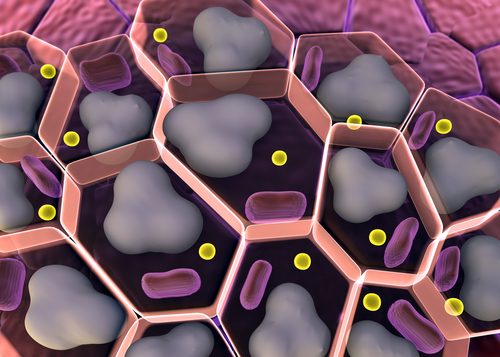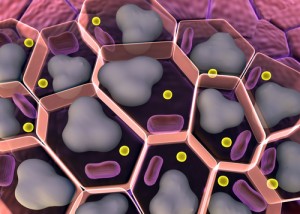Metabolism Influences Fibrosis in SSc
Written by |

 Fibrosis and metabolism: the two were recently linked in a study presented at the 2014 American College of Rheumatology Meeting in November. “Adiponectin Is an Endogenous Anti-Fibrotic and Target in Systemic Sclerosis: Novel Link Between Fibrosis and Metabolism,” presented by Dr. Feng Fang from Northwestern University and Feinberg School of Medicine, described a possible approach to a new pharmacological treatment of systemic sclerosis (SSc) based on these new findings.
Fibrosis and metabolism: the two were recently linked in a study presented at the 2014 American College of Rheumatology Meeting in November. “Adiponectin Is an Endogenous Anti-Fibrotic and Target in Systemic Sclerosis: Novel Link Between Fibrosis and Metabolism,” presented by Dr. Feng Fang from Northwestern University and Feinberg School of Medicine, described a possible approach to a new pharmacological treatment of systemic sclerosis (SSc) based on these new findings.
It was previously determined that cutaneous adipose (fat) tissue and adipogenic gene expression are lacking in patients with fibrosis due to SSc. This may be a result of decreased adiponectin cytokines and adiponectin receptors in patients with SSc. Interestingly, the reduction is inversely related to the severity of skin involvement.
The work Dr. Fang presented looked at fibrotic response in human and mouse fibroblast cell culture, skin organ culture, and a 3D equivalent of skin. The team also manipulated adiponectin signaling through genetic and pharmacological manipulation and developed adiponectin-derived peptides to target adiponectin receptors.
Mouse models of SSc lacking adiponectin showed enhanced cutaneous fibrosis and loss of intradermal adipose tissue, but when they had mutated adiponectin, fibrosis did not occur. In vitro models used along with the adiponectin-derived peptides also reduced the fibrotic response. Treating mice in vivo with these peptides also prevented and reversed induced SSc.
As a result of the work, the authors believe there is “an important homeostatic role for the adipocyte-derived cytokine adiponectin in negative regulation of [fibrosis], highlighting a novel link between metabolism and skin fibrosis.” They further iterate a novel treatment for SSc using adiponectin-derived peptides that can mask adiponectin receptors and mitigate fibrosis in mice.





